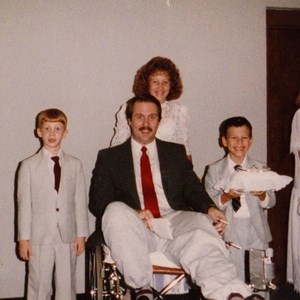My Husband's Journey to Heaven and Back
Eva Piper is no stranger to overcoming trials and heartache. When a semi-truck hit her husband, Don, on the way home from a church conference in January 1989, he was killed instantly. After being pronounced dead by paramedics on the scene, Don came back to life—90 minutes later.
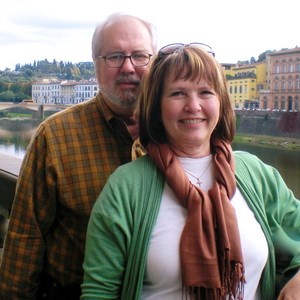
Don is a pastor best known for his New York Times best-seller, 90 Minutes in Heaven, documenting his experience to heaven and back. Many have heard about Don's journey, but few are aware of the waiting and praying that Eva did in the hospital while supporting her spouse during the painful recovery process. It took years for Don to recover from the trauma of the accident emotionally and physically, and Eva was with him every step of the way.
In A Walk Through the Dark, Eva's new book that releases today, Eva shares how her husband's 90 minutes in heaven deepened her faith for a lifetime. Here's what she had to say about caregiving and learning to trust God's whispers through frustration, anger, and tears while her husband relied on her for support and survival.
What did you learn about caregiving during Don's recovery?
First of all, caregiving is on-the-job training. It's not something you go to school to learn. There are no books that tell you how to be a caregiver. The most valuable advice I ever received was given to me by a dear friend who said, 'If you don't take care of yourself, you can't take care of Don.' I had stayed non-stop at the hospital, and I was eating out of a vending machine. All of my energy was put into making sure Don survived. During the course of that time, I wasn't resting. When you aren't rested, you can't think straight, and you can't make good decisions. My friend was very blunt in telling me I had to take care of myself. She followed up with saying, 'If you don't let others help you do that, then you're robbing them of a blessing. You're robbing them of their opportunity to minister to you.' That was hard for me because I'm an independent person.
So friends and community were important to you during this time.
Definitely. Christian friends are one of God's greatest gifts. I thought I could do this on my own, but I realized very quickly that I couldn't. When I was in the ICU with Don, I heard these words over and over again: He's on life support. I realized that after we got out of the hospital and back home, that I had been on a life support system myself. It was hard for me at first to let other people help. There was a joy in the faces of people who were able to help me, even if it was something as small as them getting me a Diet Coke. I basked in their joy, and they basked in mine. It was a wonderful experience.
How did you sense God's faithfulness during all of this?
The moment I was told of Don's accident, I heard God tell me, This is going to be hard; it's going to difficult, but it's going to be okay. Don had two broken legs and a broken arm, and during his hospital visit, he developed double pneumonia. He was so depressed and hurt. I couldn't get him to breathe or try the exercises that they wanted him to do. I felt so inadequate. I thought, Of all people, I should be able to reach him. There were many times throughout my journey that I would get in my car at the end of the day and scream at God, saying, I can't do this anymore, I'm so tired on so many levels, and I don't have it in me. He would give me the strength to go on. He would remind me in little things that he's in charge and taking care of everything.
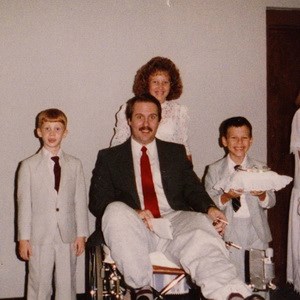
Don with their children during his recovery
I also found that prayer truly is a communication with God. That means you can tell him anything. You can tell him you're angry, and that you're tired. He never judges you for that. He gives you a peace and a comfort. God always sent the right person at the right time with the right message to help uplift me. My prayer life became something constant. It's not just me talking—it's also me taking the time to listen to what God has to say. He's doing a lot more speaking than we are doing listening.
What advice do you have for people who want to help others who have experienced tragedy with a loved one?
When you hear of a person who is in a caregiving role, jump in to help. Instead of saying, "Let me know if there's anything I can do to help you," really jump in and take action to help that person. Whether it's bringing them a meal, getting their yard mowed, or sitting in the hospital room with their loved one for 45 minutes while they go home to take a nap or get a shower, do anything to give them a break. I had so many people who did those things for me.
Also, so often in a crisis or tragedy there is a flood of people at the beginning who all want to help, and then as time goes on that number becomes fewer, and life gets in the way. Small things like taking the time to go pick out a card and send it to that person go a long way.
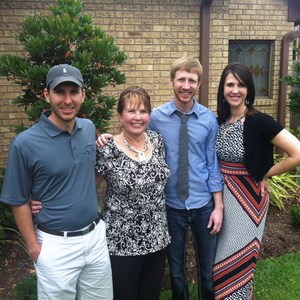
Eva with their 3 children: daughter Nicole, and twin sons, Chris and Joe
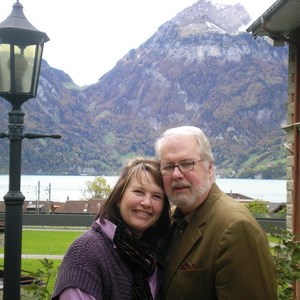
There were days during Don's recovery when I would walk out to the mailbox, and there would be a card there. To know that someone took the time to go to the store and write something as simple as, I'm thinking of you, you're in my prayers, or something specific like, I'm hoping Don had a pain-free night, then putting a stamp on it and mailing it meant so much to me. I had friends I could count on through the days, weeks, months, and years that I needed them, and I realized those relationships had to be in place before the tragedy.
That way when something happens, it's not just, Okay I need everyone to come help me. You have to put that in place ahead of time. We had done that by making sure that we spent time with people. We were involved in their lives. We were there during the happy times, the birthday parties, and the graduations, just in the day-to-day living. Because we had invested in them, they turned around and invested in us.
I'm blessed to have very special people in my life who have helped me walk along with God and opened my eyes to things I might not have seen. It's always good to have a different perspective. Friends and family have to be loved on, held, and cherished because they will then do the same thing for you.
Eva Piper is author of A Walk Through the Dark: How My Husband's 90 Minutes in Heaven Deepened My Faith for a Lifetime. Follow her on Twitter @evaLp_
Cassie Jolene Schenck is an editorial intern for Today's Christian Woman. Follow her on Twitter @CassieJolene91
Subscribe to TCW's free email newsletter at this link for weekly updates and a chance to win Eva Piper's book this week!
Read more articles that highlight writing by Christian women at ChristianityToday.com/Women
 Read These Next
Read These Next
 Whatever Happened to Dinner and a Movie?You can still pick a flick without alienating your spouse or compromising your values
Whatever Happened to Dinner and a Movie?You can still pick a flick without alienating your spouse or compromising your values
 The Great GiverSeeing God’s goodness in our very existence
The Great GiverSeeing God’s goodness in our very existence








 Homepage
Homepage
